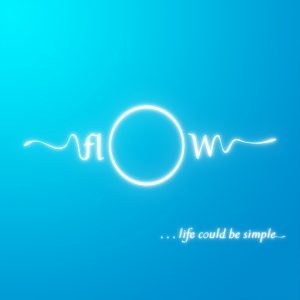
“A game is a rule-based formal system with a variable and quantifiable outcome, where different outcomes are assigned different values, the player exerts effort in order to influence the outcome, the player feels attached to the outcome, and the consequences of the activity are optional and negotiable.” (Juul 2003)
Based on this statement, I feel as though if it were up to Juul, Fl0w would be a borderline case. But first, let me give you a little background on Fl0w; In Flow, the player guides a small, multi-segmented worm- or snake-like creature through an aquatic environment. There are no menus or guidelines; the game begins immediately. The ‘game’ world, which is viewed from a top-down perspective, consists of two-dimensional planes stacked vertically upon each other. A blurred version of the layer below appears in the background of each plane. Planes contain organisms of varying sizes; the player’s creature automatically attempts to consume them when they are nearby. The majority of these creatures are non-confrontational, and are composed of cells that increase the number of segments in the player’s creature when eaten. All planes, except for the highest and lowest, contain two specially colored organisms that move the player’s creature up or down one plane when touched.
Certain planes feature aggressive, multi-segmented creatures that perish when all of their segments are eaten by the player’s creature; however, they can eat segments of the player’s creature to regrow their own. These creatures release many cells upon death, which can restore the health of the player’s creature, temporarily increase the size of its mouth, or cause it to sprout decorative protrusions. Players are not required to eat these or any other organisms; they may travel to higher or lower planes at any time. Being defeated by aggressive creatures does not result in death, but causes the player’s creature to float to a higher plane. In the flash version, the player can replay the ‘game’ with a jellyfish-like organism by defeating an aggressive creature on the bottom plane. If the player reaches the bottom again, the creature there is their original worm-like creature, and defeating it starts the game over as that organism.
Here is a link to the gameplay: (https://www.youtube.com/watch?v=fYNyB_pcGWk)

Now, the reason why Fl0w would be placed as a borderline game is because it fits in some of the ‘game’ categories on the flow chart. Yes, the rules are fixed, but there are no negotiable consequences. You are just thrown into the game, learning the consequences as you go (I wouldn’t consider that negotiable). And what may be consequences for the stage 1 creature, may not be the same for the stage 4 or 5. There are also no real quantifiable outcomes. You can eat as many of the smaller organisms as you please and your tail will continue to grow and grow. Once you get down to the final stage, there is no point system that says you have the highest or lowest score. As a matter of a fact, you do not have to collect any of the organisms to make it to the final stage. You can just solely collect one of the specially colored ones (the red one) on each stage and you will have completed the mission of the creature. Value assigned to to possible outcomes, nah. Valorization of the outcome is in play because completing all stages and advancing as a different type of creature is much better than being stuck as the same one. But the player does invest effort in order to achieve a desired outcome. It takes a considerable amount of effort to navigate successfully through each stage. There is player attached outcome because, just like most ‘games’, you are happy once you have successfully completed the mission of the game. You are also pissed off if you keep trying to complete a level but one of the enemy organisms keeps attacking you.
In order to be considered a game (according to Juul), all these things must come in to play. Therefore, this would be considered a borderline game, and I couldn’t agree more. Katie Salen and Eric Zimmerman would also agree with Juul and I given that there is no quantifiable outcome. But when it all comes down to it, no one has a true definition of ‘Game’. There are many people that propose a game definition, but who’s to say that any of them are right or wrong. I personally think that it should be up to the person playing the game. How they feel when they play, what does that particular game do that other games don’t that makes them consider it a game or not. Something with a story is a game, something where the main player has humanistic characters is a game, and something with an object as the main character is not. Who knows.
I agree with everything you said, and I find it funny that most of the other blogs about Fl0w seem to come to the same conclusion. I wonder if it is because were conditioned by AAA games and look at a game like Fl0w and can not really see it even being fun, let alone a game. Or maybe we’re all right and it really isn’t a game by traditional definition.
LikeLike
I agree. We have all been molded to this idea of what makes a video game – a video game, a board game – a board game, and so on. Fl0w doesn’t fall into that mold for many of us therefore we consider it (barely) a borderline game.
LikeLike
Did you enjoy this game? as i was reading it seemed like such a better game choice than my game and definitely funner. I played Vanitas and it was the most boring thing i’ve ever spent my time on.
LikeLike
Fl0w is like Destiny (the game) compared to Vanitas. Part of me enjoyed the aesthetics of the game, but I wouldn’t recommend it to a friend. I would recommend trying it out on your own, even if you just download the free flash version (I paid $4.99 for it). You might like it!
LikeLike
So, good job leading us through. Highlight or bold some of those keywords (negotiable consequences and whatnot) for clarity next time. Otherwise, I want to jump onto the comments. Yes, we’ve been molded to believe that a certain type of game is a game, and things that break that mold are not games. THAT is Ludica’s hegemony of play at base. The second part of it is that those things that we (and the industry) accept as games get funded, created, advertised and made into franchises. On the flip side, those that don’t seem like games don’t get funded by the main industry. Now, like with Gramsci’s ideas of hegemony, we’re happy as we are. We’re happy being a part of the system as long as the system caters to us (and we like the type of games it makes). It’s only when we are not part of the system that it caters to that we begin to get angry. Anyway, good post and good comments.
LikeLike
Thanks for the insight professor. Ill keep that in mind for the upcoming entry.
LikeLike
So it seems that when deciding on what a “game” is, its subjective. I agree. I was watching an interview one of my favorite rappers and he says the only real two choices we have are “coke and pepsi.” Where he explains that unless we create something ourselves, we are forced to choose only based on what were are given.
LikeLike
It is hard to argue Flow is a game or not, but I am agree with most of you view in your post. I actually haven’t play the Flow, but I see it is similar to the old video game call Snake; you eat stuff and you grow longer. It is good to use Juul’s article to analysis the Flow, I really see how the Flow fit into his game theory. Although I am not really see the outcome of the game, I guess I may have to actually play it to help me understand more about this game.
LikeLike
I haven’t played the game enough to know the one true ending/outcome. But I do know that at the end of each level, the outcome is that you morph into a different type of organism. You become bigger and stronger, enemies change, but it just keeps going on from there.
LikeLike
I think it is easy to jump to the conclusion that Flow should be compared to Snake since you have a creature that is roughly the shape and does the same thing. However, I feel snake has a quantifiable outcome where jsurrell points out that Flow doesn’t really. The length of your snake is determined by how many cubits it has in it, which if you counted how many cubits you had before you died, could be considered a quantifiable outcome. And also, Snake drops you in without any real knowledge of the game mechanics just like Flow does, but Snake’s mechanics are much easier for the player to get their head around making it a bit more like a traditional game.
LikeLike
Good writing. I have not played this game, but you give a very clear description of it. And I will agree with you that you choose the FLOW is a game because of Juul’s definition. However, you might need to explain all six factors that he mentions.
LikeLike
Would I need to explain all 6 factors even though I consider it a “Borderline game”? Im not so sure about that. Because if it fulfills all 6, its a game (not my argument), if it doesn’t fulfill all, its not a game (not my argument). There were only certain ones that needed to be fulfilled in order for it to be a borderline game, which were the ones that I outlined.
LikeLiked by 1 person